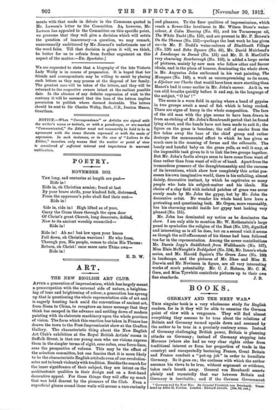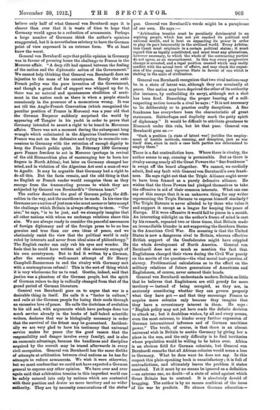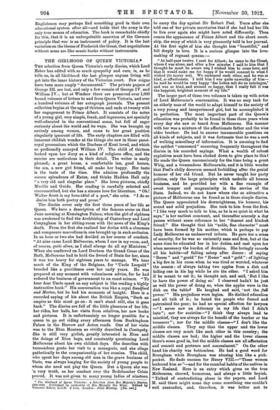BOOKS.
GERMANY AND THE NEXT WAR.*
THIS singular book is a very wholesome study for English readers, for in it they will be able to examine the German point of view with a vengeance. They will find almost everything they assume to be true about the relations of Britain and Germany turned upside down and assumed by the author to be true in a precisely contrary sense. Instead of Germany challenging British power, Britain is planning attacks on Germany ; instead of Germany stepping into Morocco (where she had no very clear rights either from traditional interest or from her proportion of trade in the country) and unexpectedly hectoring France, Great Britain and France conduct a "put-up job" in order to humiliate Germany. So it goes on; the coolness with which the author assumes his views to be true, without argument or evidence, takes one's breath away. General von Bernhardi asserts plainly and repeatedly that war between Britain and Germany is inevitable ; and if the German Government 'Germany and the Next War. By General Friedrich von Beritharcli. Trans- lated by Allen II. Fowles. London: Edward Arnold. [10s. 6d. net.] believe only half of what General von Bernhardi says it is clearer than ever that it is waste of time to hope that Germany would agree to a reduction of armaments. Perhaps a large number of Germans think the author's opinions
exaggerated, but it is nevertheless salutary to have the German point of view expressed in an extreme form. We at least know the worst.
General von Bernhard' says that public opinion in Germany was in favour of pressing home the challenge to France in the
Morocco affair. "A deep rift had opened between the feeling of the nation and the diplomatic action of the Government." We cannot help thinking that General von Bernhardi does an injustice to the mass of his countrymen. Surely the anti-
French policy was the pure invention of the Government, and though a great deal of support was whipped up for it, there was no natural and spontaneous ebullition of senti- ment in the nation such as there is when a people stands consciously in the presence of a momentous wrong. It was not till the Anglo-French Convention (which recognized the peculiar position of France in Morocco) was a year old that the German Emperor suddenly surprised the world by appearing off Tangier in his yacht in order to prove that Germany intended to assert a right to be heard in Moroccan affairs. There was not a moment during the subsequent long wrangle which culminated in the Algeciras Conference when France was not on the defensive and trying to reconcile con- cessions to Germany with the retention of enough dignity to keep the French public quiet. In February 1909 Germany gave France freedom to act in Morocco (perhaps in revival of the old Bismarckian plan of encouraging her to burn her fingers in North Africa); but later on Germany changed her mind, and in violation of the Algeciras Act sent a man-of-war to Agadir. It may be arguable that Germany had a right to do all this. But the facts remain, and the odd thing is that no English or French reader would recognize them as they emerge from the transmuting process to which they are subjected by General von Bernhardi's "German heart."
The author describes the goal of German policy, the diffi- culties in the way, and the sacrifices to be made. In his view the Germans are a nation of just men who must sooner or later accept the challenge which Britain is always offering to them. "Our aim," he says, "is to be just, and we strangely imagine that all other nations with whom we exchange relations share this aim. We are always ready to consider the peaceful assurances of foreign diplomacy and of the foreign press to be no less genuine and true than our own ideas of peace, and we obstinately resist the view that the political world is only ruled by interests and never from ideal aims of philanthropy." The English reader can only rub his eyes and wonder. He feels that he could have written all this sincerely enough of his own countrymen. But to find it written by a German, after the extremely well-meant attempt of Sir Henry Campbell-Bannerman to end the rivalry with Germany met with a contemptuous refusal ! This is the sort of thing which it is very wholesome for UB to read. Goethe, indeed, said that justice was a phantom of the German people, but the spirit of German rulers to-day is radically changed from that of the grand period of German literature.
General von Bernbardi goes on to argue that war is a desirable thing in itself. He calls it a "factor in culture," and rails at the German people for losing their souls through an excessive love of peace. He calls the doctrines of evolution to his aid and, with arguments which have perhaps done too much service already in the books of half-baked scientific writers, declares that war is biologically necessary in order that the survival of the fittest may be guaranteed. Incident- ally we are very glad to have his testimony that universal service makes for peace (for the good reason that the responsibility and danger involve every family), and is also an economic advantage, because the handiness and discipline acquired by the recruit may be traced afterwards in every civil occupation. General von Bernhard' has the same dislike of attempts at arbitration between rival nations as he has for attempts to reduce armaments. We wish it were otherwise, but we must confess that we could not have expected a German general to express any other opinion. We have over and over again said that arbitration treaties in this imperfect world can be safely entered into only by nations which are contented with their position and desire no more territory and no wider authority. They are by necessity consecrations of the status quo. General von Bernhardi's words might be a paraphrase of our own. He says :- "Arbitration treaties must be peculiarly detrimental to an aspiring people, which has not yet reached its political and national zenith, and is bent on expanding its power in order to play its part honourably in the civilized world. Every Arbitra- tion Court must originate in a certain political status ; it must regard this as legally constituted, and must treat any alterations, however necessary, to which the whole of the contracting parties do not agree, as an encroachment In this way every progressive change is arrested, and a legal position created which may easily conflict with the actual turn of affairs, and may check the expan- sion of the young and vigorous State in favour of one which is sinking in the scale of civilization.
General von Bernhardi recognizes that two rival nations may be in a state of latent war, although they are nominally at peace. One nation may have deprived the other of its authority (for instance, by outbuilding its navy), although not a shot
has been fired. Describing the proper bearing of a self-
respecting nation towards a rival he says : "It is not necessary to lie deliberately or to practise crafty deceptions. A fine frankness has everywhere been the characteristic of great statesmen. Subterfuges and duplicity mark the petty spirit of diplomacy." It would be difficult to attribute greatness to Bismarck under this rule, but let that pass. General von Bernhardi goes on :—
"Such a position [a state of latent war] justifies the employ- ment of hostile methods, cunning, and deception, just as war itself does, since in such a case both parties are determined to employ them."
There is a fiat contradiction here. Where there is rivalry, tho author seems to say, cunning is permissible. But as there is rivalry among nearly all the Great Powers the " fine frankness" is swept off the board altogether. We cannot, we cordially admit, find any fault with General von Bernhardi's own frank- ness. He says right out that the Triple Alliance ought never
to have been framed as a purely defensive alliance. He wishes that the three Powers had pledged themselves to take the offensive in aid of their common interests. What can one say of this except that it is an unknown thing for any writer representing the Triple Entente to express himself similarly?
The Triple Entente is never alluded to by those who value it and support it except as a league for keeping the peace of Europe. If it were offensive it would fall to pieces in a month. An interesting sidelight on the author's frame of mind is cast
by his remark, repeated two or three times, that Britain made an irremediable blunder in not supporting the Southern States in the American Civil War. His meaning is that the United
States is now a dangerous rival to Britain, whereas effective British support of the Confederates might have crippled the whole development of North America. General von Bernhardi does not so much as mention the fact that Englishmen changed their views during the Civil War purely on the merits of the question—the vital moral test-question of slavery. Problematical calculations as to the effect on the military relations of future generations of Americans and Englishmen, of course, never entered their heads.
General von Bernhardi understands modern Britain so little that he believes that Englishmen are still greedy for more territory — instead of being occupied, as they are, in anxiously considering whether they can govern properly what they have got — and that they encourage France to
acquire more colonies only because they imagine that they have a reversionary interest in them. He says : "English policy may not yet have made the definite decision to attack us ; but it doubtless wishes, by all and every means, even the most extreme, to hinder every further expansion of German international influence and of German maritime power." The truth, of course, is that there is an almost universal wish in Britain to soothe Germany by giving her a
place in the sun, and the only difficulty is to find territories whose population would be willing to be taken over. Africa is an obvious field fcr German colonists, but General von Bernhardi remarks that all African colonies would mean a loss to Germany. What he does want he does not say. In this respect this plain-speaking book is unsatisfactory ; it is full of contradictions, and ultimately leaves the problem it states unsolved. Yet it must by no means be ignored as a definition
—an extreme one, no doubt—of a state of mind against which Great Britain has to contend. It is absolutely devoid of bragging. The author is by no means confident of the issue of the war he predicts. He abases German education-
Englishmen may perhaps find something good in their own educational system after all—and holds that the army is the only true means of education. The book is remarkable chiefly for this, that it is an unforgettable assertion of the German principle that war is an instrument of policy. It is the last variation on the theme of Frederick the Great, that negotiations without arms are like music books without instruments.




















































 Previous page
Previous page